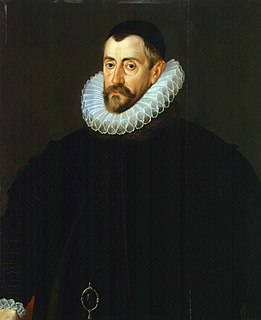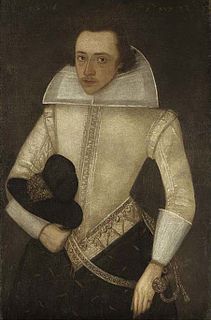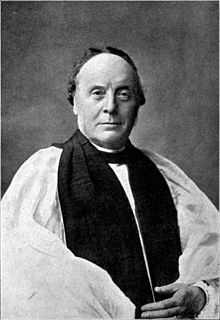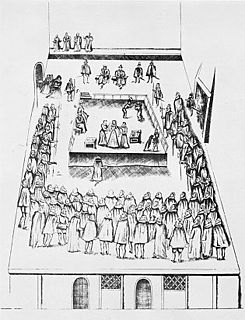
Sir Francis Walsingham was principal secretary to Queen Elizabeth I of England from 20 December 1573 until his death and is popularly remembered as her "spymaster".

Adam Loftus was Archbishop of Armagh, and later Dublin, and Lord Chancellor of Ireland from 1581. He was also the first Provost of Trinity College Dublin.
William Knight was the Secretary of State to Henry VIII of England, and Bishop of Bath and Wells.

Arthur Lake was Bishop of Bath and Wells and a translator of the King James Version of The Bible.

Sir Anthony Babington was an English gentleman convicted of plotting the assassination of Elizabeth I of England and conspiring with the imprisoned Mary, Queen of Scots. The "Babington Plot" and Mary's involvement in it were the basis of the treason charges against her which led to her execution. He was a member of the Babington family.

Herbert Croft (1603–1691) was an English churchman, bishop of Hereford from 1661.

Alfred Barry was the third Bishop of Sydney serving 1884–1889. Bishop Barry over the course of his career served as headmaster of independent schools, Principal of King's College London university and founded Anglican schools. He officiated at the funeral of Charles Darwin in 1882.

Thomas Wilson (1524–1581), Esquire, LL.D., was an English diplomat and judge who served as a privy councillor and Secretary of State (1577–81) to Queen Elizabeth I. He is remembered especially for his Logique (1551) and The Arte of Rhetorique (1553), which have been called "the first complete works on logic and rhetoric in English".
Robert Wilmer Woods,, known as Robin Woods, was an English Anglican bishop. He was the Bishop of Worcester from 1971 to 1982. He previously served as Archdeacon of Sheffield from 1958 to 1962, and as Dean of Windsor from 1962 to 1970.
John Watson (1520–1584) was Bishop of Winchester in the 1580s.
Sir Thomas Heneage PC was an English politician and courtier at the court of Elizabeth I.
Sir John Herbert was a Welsh lawyer, diplomat and politician who sat in the House of Commons at various times between 1586 and 1611. He was Secretary of State under Elizabeth I and James I.
Richard Curteys (c.1532?–1582) was an English churchman. A native of Lincolnshire, after his education at St. John's, Cambridge he was ordained and eventually became chaplain to Queen Elizabeth I. He was made dean of Chichester cathedral and then Bishop of Chichester. Curteys was reputedly a promoter of preaching and the clerical improvement of Anglicanism. In Curteys' episcopate, the cost of supporting many residentiaries and providing hospitality, could not be funded by the relatively small income of Chichester Cathedral. Curteys remodelled the constitution to reduce costs. Despite the changes Curteys died penniless.

Robert Beale was an English diplomat, administrator, and antiquary in the reign of Elizabeth I. As Clerk of the Privy Council, Beale wrote the official record of the execution of Mary, Queen of Scots, to which he was an eyewitness.

In the Kingdom of England, the title of Secretary of State came into being near the end of the reign of Queen Elizabeth I (1558–1603), the usual title before that having been King's Clerk, King's Secretary, or Principal Secretary.
Francis Willis D.D. was an academic administrator at the University of Oxford and Dean of Worcester.

Anthony Bacon (1558–1601) was a member of the powerful English Bacon family and was a spy during the Elizabethan era. He was Francis Bacon's brother.
John Banks Jenkinson was an English bishop who was the Bishop of St David's from 1825.
Lichfield Theological College was founded in 1857 to train Anglican clergy to serve in the Church of England. It was located on the south side of the Cathedral Close in Lichfield, Staffordshire and closed in 1972.
Dr. Patrick Sheridan was the Church of Ireland Bishop of Cloyne between 1679 and 1682.









